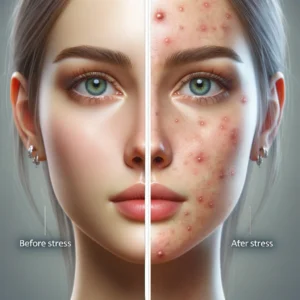You know that feeling when you’re stressed out and your skin looks terrible? It’s not a coincidence.
Stress is one of the worst enemies of your skin, causing all kinds of problems from acne and dullness to wrinkles and sagging.
But why does stress affect your skin so much? And more importantly, how can you prevent it from ruining your skin?
In this article, we’ll explore the science behind the stress-skin connection and share some practical tips to keep your skin healthy and radiant despite the challenges of life.
Are you ready to say goodbye to stress-induced skin woes? Then read on.
How Stress Impacts Skin: A Scientific Explanation
To grasp how stress manifests on our skin, we must first understand what happens in our body when we feel strained.
In stressful situations, our bodies release cortisol and adrenaline – two potent stress hormones. While these hormones prep us for “fight or flight“, they also spark a cascade of skin-disrupting reactions.
Here’s a breakdown of the science:
Inflammation Overdrive
Ever notice your skin gets unusually red or irritated when you’re stressed? You have inflammation to thank.
Too much cortisol triggers widespread inflammation, inciting everything from generalized redness and sensitivity to full-on breakouts.
Over-the-top inflammation stems from cortisol suppressing our skin’s immune defenses – think of it as knocking our skin’s protectors off duty.
This act of sabotage leaves our skin extra vulnerable to inflammatory triggers like bacteria, pollution, and UV damage. No wonder it’s quick to get inflamed and angry when we’re stressed!
Collagen and Elastin Breakdown
Cortisol doesn’t just suppress our skin’s defenses – it also ravages vital structural proteins like collagen and elastin.
Collagen provides firmness and elastin lends elasticity. By demolishing these proteins, cortisol paves the way for loose, crepey skin. No surprise stress accelerates aging!
Scientists also discovered cortisol elongates telomeres, the protective end caps on DNA strands. This stymies cell renewal, allowing damage to accumulate.
Sebum Overproduction
When we’re frazzled, our sebaceous glands pump out excess sebum. This oily substance clogs pores and feeds acne-causing bacteria.
Add in inflammation, and it’s a perfect storm for breakouts. No wonder acne worsens when we’re tense!
Delayed Healing
By diverting energy to immediate survival, stress also slows wound repair. This explains why cuts, scrapes, and burns seem to take eons to heal when we’re stressed.
Dragged-out healing also means more opportunities for scarring and infection. Just another example of how stress makes our skin more vulnerable.
Compromised Moisture Barrier
Ever battle inexplicably dry, flaky skin during stressful times? Blame your moisture barrier.
This barrier prevents water loss to keep skin hydrated and balanced. But stress disrupts its lipid composition, allowing moisture to escape.
The end result? Taut, parched skin begging for hydration.
How Stress Manifests on Skin: 7 Common Problems
Now that we know how stress disrupts skin’s normal functioning, let’s explore how these reactions manifest day-to-day.
Here are 7 all-too-common problems arising from stress:
1. Acne Breakouts

Whether you occasionally get a stress zit before a big presentation or regularly battle body breakouts when pressured, stress often equates to acne.
By driving excess sebum production, inflammation, and delayed healing, stress creates a perfect acne storm.
Whiteheads, blackheads, cystic bumps – you name the blemish type and stress can likely trigger it.
Those with acne-prone skin typically see the greatest impact, as stress exacerbates their existing tendency for breakouts.
2. Rashes and Eczema Flare-Ups
If you’re eczema-prone, get ready for more frequent and severe flares when stressed.
By compromising the skin’s protective barrier and ramping up inflammation, stress makes skin far more reactive. Skin readily becomes red, rough, and itchy.
Even those not diagnosed with eczema may experience stress-induced rashes. Poison ivy reactions can worsen and last longer under stress, for example.
3. Premature Aging
Fine lines, wrinkles, and dull, sagging skin seem to emerge overnight when we’re stressed.
By degrading collagen, elastin, and telomeres, stress accelerates skin aging. Those pesky “stress lines” and wrinkles, like forehead furrows and crow’s feet, usually become more prominent.
Surface dryness, reduced radiance, and loss of elasticity signal that stressed skin is aging faster than it should.
4. Skin Sensitivity
One day your skin is seemingly normal, the next it stings, burns, and turns tomato red at the slightest disruption. Such sensitivity issues often arise during stressful life events.
By amplifying inflammation and damaging the skin’s protective lipids, stress makes skin extra-reactive. Occasional sensitivity may surface during especially stressful times.
5. Delayed Wound Healing
Skinned knees, paper cuts, and surgical incisions all take longer to heal when we’re stressed.
If you notice your wounds healing unusually slowly, stress likely plays a role by stalling cellular repair and regeneration.
Sluggish healing also raises the chances of scarring and infection. Yet another reason to keep stress in check for optimal skin health!
6. Hives and Heat Rash
Out-of-the-blue hives or itchy bumps often signal high-stress levels. These red, raised welts crop up out of nowhere – and seemingly for no reason at all.
Heat rash and eczema can also flare under stress, creating itchy, uncomfortable patches.
By lowering the skin’s tolerance and amplifying inflammation, stress sends skin reactivity through the roof. The result? Random bouts of hives, rashes, and bumps.
7. Dandruff and Scaly Skin
If your scalp and skin inexplicably dry out and start flaking, stress may drive this newfound dryness.
Recall that stress impairs the skin’s moisture barrier, allowing vital hydration to escape. Flakiness and scaliness often result.
Dandruff typically worsens under stress as well. Essentially, stress drags your skin’s hydration levels downhill fast.
Why Stress Impacts Skin: The Vicious Cycle
Now we understand how stress manifests on the skin through various problems like acne, rashes, and premature aging. But why exactly does stress wreak such havoc in the first place?
It comes down to a vicious self-perpetuating cycle:
Stage 1: Stress triggers skin reactions
As outlined earlier, cortisol and adrenaline disrupt normal skin functioning, causing issues like acne and sensitivity.
Stage 2: Skin issues spark more stress
Unsightly skin issues like breakouts understandably cause more emotional stress and anxiety.
Seeing our skin at less than its best chips away at self-confidence and stokes worry over the skin’s condition.
Stage 3: More stress worsens skin
Heightened stress then further exacerbates the original skin problems. Acne worsens, sensitivity intensifies, and so on.
Stage 4: The cycle starts anew
Worsening skin issues in turn incite more stress, continuing the vicious cycle. Eventually, stress and skin problems feed off each other in an endless loop.
Breaking this cycle requires simultaneously addressing stress levels AND caring for skin properly. We’ll explore how to do just that later on.
First up – how to spot if your skin woes tie back to stress.
How to Spot Stress-Related Skin Issues
With stress subtly yet substantially impacting skin health, it’s crucial we detect when our issues relate back to stress so we can address the root cause.
Here are 5 telltale signs of stress manifesting on the skin:
1. Problems after a major life event
Did your acne start after a traumatic breakup or job loss? Did your eczema worsen after a move or death in the family?
Skin issues emerging during or after major stressful life events often relate back to the stress itself. The timing is a dead giveaway.
2. Onset of new skin issues for no apparent reason
If you suddenly develop eczema or find yourself battling monthly breakouts out of the blue, stress likely fuels these mysterious new skin problems.
3. Intensifying existing skin problems
Do your psoriasis plaques grow bigger and thicker during stressful times? Does your rosacea worsen when you’re anxious or worried? If so, stress almost certainly amplifies your symptoms.
4. Skin problems only in stress-prone areas
Are your breakouts localized to acne hotspots like your forehead and chin? Is your eczema patchy and confined to elbows and knees? This localization points to stress as the instigator.
5. Flare-ups during stressful events or seasons
Do your cold sores erupt before big projects at work? Does your skin itch uncontrollably during anxious times? These patterns reveal stress as the trigger.
If flare-ups coincide with tax deadlines, holidays, school exam periods, or other stressful times, stress likely plays a role.
Tips to Improve Stress-Related Skin Problems

Ready to break the vicious stress skin cycle and restore your glow? Here are 7 research-backed tips to minimize stress and offset its skin-ravaging effects.
1. Adopt stress-relieving habits
To reduce cortisol and adrenaline at the source, adopt daily habits that lower stress.
Deep breathing, meditation, yoga, brisk walks, stretching, and laughing more can all help diffuse daily stress.
2. Scale back intense exercise
While light exercise reduces stress, intense workouts like CrossFit and HIIT can make cortisol skyrocket. This breeds breakouts!
Moderate your workouts, do more yoga-style classes, and always follow exercise with chill-out time.
3. Get enough sleep
Aim for 7-9 hours per night. Sleep is when skin best repairs and rejuvenates itself. Failing to get enough slows healing and exacerbates stress levels.
4. Give yourself mini-breaks
Take 5-10 minutes every 2 hours to decompress. Step outside, listen to calming music, take some deep breaths. These quick breaks help reset your mindset.
5. Set reasonable timelines
Rushed, unrealistic deadlines ignite stress. Set manageable timelines to complete tasks calmly and avoid down-to-the-wire panic.
6. Boost skin’s repair functions
Wash skin gently with lukewarm water to avoid disrupting its acid mantle. Seal in moisture day and night with a hydrating moisturizer. Apply antioxidant serums to neutralize skin-damaging free radicals.
7. Know your stress triggers
Keep a skincare diary tracking flare-ups. Note activities, foods, environments, and events that worsen your skin. Avoiding these known triggers reduces their skin impacts.
Expert Skincare Tips for Stress-Related Skin Problems
While reducing stress is crucial, we still must care for our skin properly to keep issues at bay. Here are pro skincare tips to offset stress-induced skin damage:
Gently cleanse
Use a non-stripping, non-irritating cleanser like Cetaphil to clear away oil and impurities without disrupting your skin’s protective moisture barrier.
Hydrate mindfully
Quench dehydrated skin with lightweight gels, serums, and creams packed with hydrators like hyaluronic acid and glycerin. Avoid rich, greasy products if acne-prone.
Soothe with botanicals
Calm redness, irritation, and inflammation with soothing botanicals like aloe, chamomile, green tea, and calendula.
Choose non-comedogenic formulas
If acne-prone, use only non-comedogenic products, which don’t contain pore-clogging ingredients. Check labels before buying.
Protect with SPF
Shield skin from UV and pollution damage by applying broad-spectrum SPF 30 sunscreen daily, even on cloudy days.
Treat gently
Avoid abrasive scrubs, alcohol-based toners, and harsh astringents that can worsen sensitivity. Treat skin gently.
Spot treat strategically
Zap the occasional stress zit with benzoyl peroxide or salicylic acid spot treatment. Apply only on the affected area to avoid skin irritation.
Professional Treatments for Stress-Related Skin Issues
For moderate to severe stress-related skin conditions, professional in-office treatments may be needed alongside stress reduction tactics and homecare.
Here are some top treatment options:
Light Therapy
In-office LED light therapy kills acne bacteria, reduces inflammation, and stimulates collagen. Often used to treat inflammatory acne and rosacea.
Chemical Peels
Glycolic, salicylic, and lactic acid peels exfoliate and renew skin, reducing acne lesions, fine lines, and hyperpigmentation from past breakouts.
Laser Treatments
Laser resurfacing smooths scars and wrinkles by removing outer skin layers and stimulating collagen. Also improves redness, melasma, and sun damage.
Microneedling
Tiny microneedles prick the skin to generate new collagen and elastin while allowing penetration of skincare actives.
Stress Management Services
Many clinics now couple traditional facials and treatments with stress management via massage, meditation, yoga, and cognitive behavioral therapy. This 360 approach addresses both skin damage and the underlying stress root cause.
But in-office treatments work best alongside finding inner calm and adopting stress-busting habits day-to-day. Reducing cortisol levels is truly key for clear, glowing skin.
The Takeaway: Tackling Stress Is Essential for Skin Health
While we all endure some amount of stress, it doesn’t have to wreak havoc on our skin. Understanding precisely how stress manifests through inflammation, sensitivity, acne, eczema, and premature aging gives us insights into offsetting its effects.
With daily stress management habits, proper at-home skincare, and occasional professional treatments, we can have our cake and eat it too – staying sane while sporting luminous, healthy skin.
Here’s the key point to remember: reducing stress is just as essential as quality skincare in ensuring skin looks and feels its best. By pairing a mindful, calming lifestyle with smart skincare, our skin will reflect our zen state within, radiating health and inner harmony.

